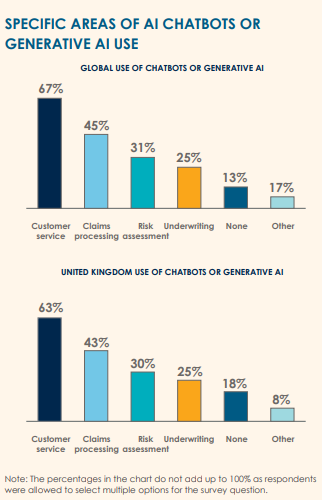A majority of global insurers are actively endorsing the application of AI chatbots and generative AI in claims resolution processes, underwriting and customer fulfilment, according to a survey conducted by Gallagher Bassett, the claims-services provider and subsidiary of Arthur J. Gallagher & Co.
The survey found that insurers in 2024 are placing an emphasis on the utilization of artificial intelligence (AI) technologies, appropriately assessing underwriting risks to inform pricing decisions, and employee retention strategies, said the survey report titled “The Carrier Perspective: 2024 Claims Insights.”
The survey shows that the primary area utilizing these technologies is customer service (67%) and claims processing (45%).
While the order of implementation remains consistent across global regions, there is a slight variation in percentage values, Gallagher Bassett explained. For example, among UK insurers, “customer service is still the predominant area for implementing AI chatbots and generative AI, with an adoption rate of 63%, followed by claims processing at 43%. Risk assessment accounts for 30%, and underwriting operations hold a share of 25%, both in line with the global sentiment.”

(Editor’s note: A chatbot is described by Oracle as “a computer program that simulates and processes human conversation – either written or spoken – allowing humans to interact with digital devices as if they were communicating with a real person.”)
The survey found that, internationally, a significant portion of insurers – 44% — are currently in the process of integrating AI chatbots or generative AI into the claims resolution process, while 42% have already successfully incorporated these technologies.
“Regionally, there are minimal variations. In the UK, 40% of insurers have already embraced AI chatbots or generative AI tools, while 43% are actively progressing towards implementing them,” the survey report states.
Gallagher Bassett emphasized that sole reliance “on historical claims data is no longer a viable option for insurers due to the impact of social, economic, and geopolitical factors.”
As a result, insurers are placing greater importance on the use of AI and data analytics, which allows them “to make more accurate predictions and informed decisions in a rapidly changing and inflationary environment.”
Gallagher Bassett noted some insurers are implementing AI chatbots in the claims process, mainly in high frequency/low severity personal lines, such as auto property damage. “Notably, most global insurers are actively endorsing the application of AI chatbots and generative AI in claims resolution processes, as well as underwriting and customer fulfilment.”
Note of Caution
Gallagher Bassett warned, however, that insurers must exercise caution when implementing chatbots for complex liability claims.
“Such claims necessitate the expertise of experienced claims professionals to ensure thorough risk mitigation,” the report continued. “While chatbots can assist in certain aspects of the claims process, it is crucial to strike a balance between automation and human involvement to guarantee fast, accurate, and comprehensive handling of complex claims.”
Primary Concerns
The report noted that incorporating AI brings challenges, particularly in the initial phases, when it must “coexist with conventional methods.”
Looking specifically at the UK market, Gallagher Bassett said the primary concern for 33% of UK insurers revolves around the seamless integration of AI into business operations.
“Ensuring compliance (28%) in the implementation of AI is the second major concern among insurers in the region. Apprehension regarding data privacy and security is on the minds of 20% of UK insurers, while 13% have reported hurdles associated with determining suitable applications of AI. A further 12% of insurers have voiced concerns about staff adoption of AI.”
Gallagher Bassett said it is pivotal to the industry’s future that concerns are eased over the integration of AI and the establishment of best practices. “In order to securely realise the opportunities AI presents for claims processing, the approach needs to focus on data privacy and ease of use.”
Other report findings include:
- Supply chain disruptions affect 62% of all global insurers’ claims resolution processes.
- Digital claims processing is a top priority for more than half of surveyed insurers.
- Litigated claims are settling at increased costs, according to 33% of UK insurers.
- Most global insurers (86% of respondents) depend on climate data and analytics in their risk assessment and underwriting processes to some extent.
- Generative AI chatbots are used by 63% of UK insurers in their customer service operations, underscoring the industry’s increasing reliance on AI solutions.
- More than half (54%) of global respondents have implemented digital claims processing to address supply chain challenges, and 62% say the challenges have a moderate to significant impact.
- Across the globe, 30% of insurers say hybrid work arrangements have significantly reduced employee engagement.
- In the UK, 45% of insurers are concerned about the long-term sustainability of hybrid work arrangements.
- A significant number of global respondents (84%) emphasised the pivotal role competitive salaries play in retaining top talent.
Gallagher Bassett said 150 insurance businesses in North America, the United Kingdom, Australia, and New Zealand were surveyed. Participants comprised 85% insurers, with MGAs and MGUs accounting for 11%, and underwriting agencies constituting the remaining 4%.
Was this article valuable?
Here are more articles you may enjoy.

 Why 2026 Is The Tipping Point for The Evolving Role of AI in Law and Claims
Why 2026 Is The Tipping Point for The Evolving Role of AI in Law and Claims  Portugal Rolls Out $2.9 Billion Aid as Deadly Flooding Spreads
Portugal Rolls Out $2.9 Billion Aid as Deadly Flooding Spreads  Credit Suisse Nazi Probe Reveals Fresh SS Ties, Senator Says
Credit Suisse Nazi Probe Reveals Fresh SS Ties, Senator Says  Hackers Hit Sensitive Targets in 37 Nations in Spying Plot
Hackers Hit Sensitive Targets in 37 Nations in Spying Plot 